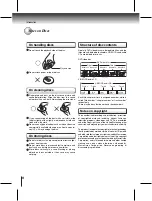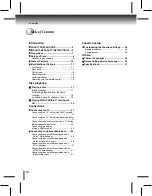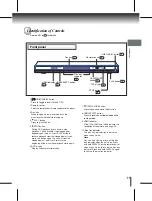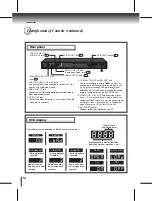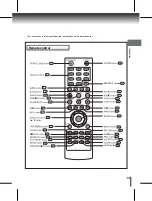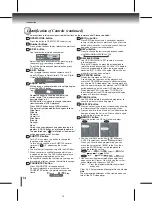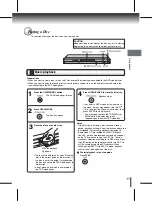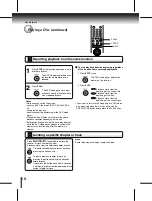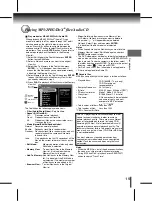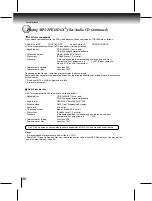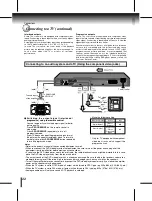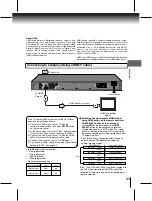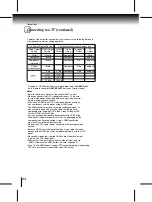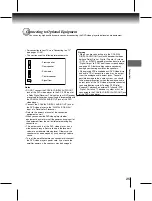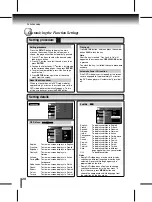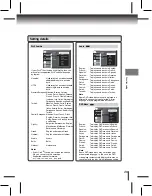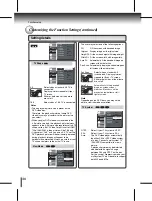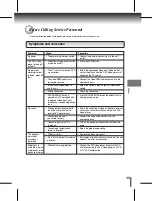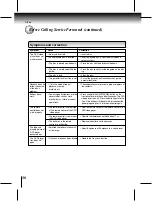
22
Connections
To wall outlet
Connecting to an audio system and a TV (Using the component video jacks)
Interlaced outputs
Some TVs or monitors are equipped with component video
inputs. Connecting to these inputs allows you to enjoy higher
quality picture playback.
Actual labels for component video inputs may vary depending
on the TV manufacturer. (ex. Y, R-Y, B-Y or Y, C
B
, C
R
)
In some TVs or monitors, the colour levels of the playback
picture may be reduced slightly or the tint may change. In
such a case, adjust the TV or monitor for optimum
performance.
Progressive outputs
Some TVs or monitors are equipped with component video
inputs that are capable of reproducing a progressively scanned
video signal. Connecting to these inputs allows you to view the
highest quality pictures with less flicker.
Consumers should note that not all high definition television
sets are fully compatible with this product and may cause
artifacts to be displayed in the picture. In case of 525 or 625
progressive scan picture problems, it is recommended that
the user switch the connection to the “standard definition”
output. If there are questions regarding our TV set compatibility
with this model 525p or 625p DVD player, please contact our
Customer Service Center.
Connecting to a TV (continued)
Switching the output signal (interlaced /
progressive) using the remote control
You can temporarily switch the output signal for better
picture quality.
Press
PROGRESSIVE
on the remote control in
stop mode.
Press
PROGRESSIVE
repeatedly to turn off
progressive mode.
If your TV does not support the progressive scan format,
the picture will appear scrambled or blank. To return to
normal picture, press
PROGRESSIVE
button repeatedly
to turn off progressive mode.
Notes
• Refer to the owner’s manual of the connected equipment as well.
• When you connect the DVD video player to other equipment, be sure to turn off the power and unplug all of the
equipment from the wall outlet before making any connections.
• If you place the DVD video player near a tuner or radio, the radio broadcast sound might be distorted. In this case,
place the DVD video player away from the tuner and radio.
• The output sound of the DVD video player has a wide dynamic range. Be sure to adjust the receiver’s volume to a
moderate listening level. Otherwise, high volume sound may damage your hearing as well as the speakers.
• Turn off the amplifier before you connect or disconnect the DVD video player’s power cord. If you leave the amplifier
power on the speakers may be damaged.
• When the TV system is set to NTSC mode, all output will be forced to NTSC type (eg. 525p (480p), 525i (480i), etc.)
• When the TV system is set to PAL mode, all output will be forced to PAL type (eg. 625p (576p), 625i (576i), etc.)
• Analogue audio out will not have sound if DTS playback is selected.
* Only for TV equipped with component
video input jacks which support the
progressive scan.
• Make the following setting.
On-screen display
Select:
Page
“PCM” or
“Bitstream”
“Digital Output”
Component
HDMI
*P-Scan
(Progressive)
“Video Output”
31
32
To Y video
input
To P
B
video
input
To P
R
video
input
To ANALOGUE
AUDIO OUT
To audio inputs
of the amplifier
(red)
(white)
(red)
(white)
Audio system
Содержание SD-469EKE
Страница 38: ... 2ECYCLE PAPER 0RINTED IN HINA 43 6 ...

